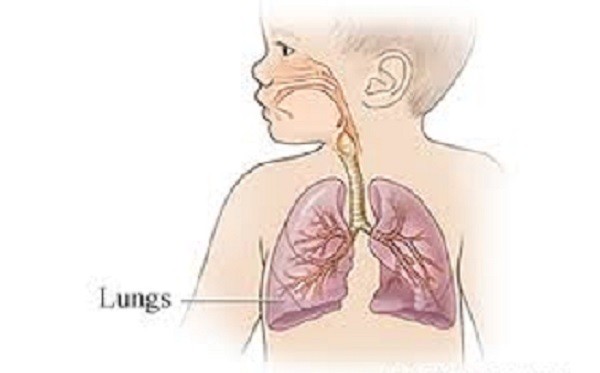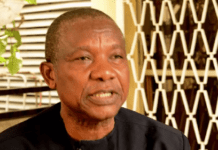
The Federal Government has declared a State of Emergency on childhood tuberculosis in the country.
Dr Chukwuma Anyaike, the Coordinator, National Tuberculosis, Buruli Ulcer and Leprosy Control Programme (NTBLCP), announced this in Abuja at the bi-weekly meeting of the Federal Ministry of Health (FMOH) on COVID-19 and other infectious diseases in the country.
The News Agency of Nigeria (NAN) reports that Tuberculosis (TB) is a contagious disease that is caused by bacteria (Mycobacterium tuberculosis) that often
affect the lungs.
The bacteria that cause tuberculosis are spread from person to person through tiny droplets released into the air via coughs and sneezes.
NAN quotes the World Health Organisation (WHO) as stating that “Nigeria has recorded a 50 per cent increase in TB notification from 138,591 TB cases
in 2020 to 207,785 TB cases in 2021.
“Also, about six per cent of all forms of notified TB cases in 2021 were children less than 15 years. TB is an important infectious disease of public health concern.
“The effects of TB on children in terms of morbidity and mortality are more than that of adults and the ugly development may not be unconnected with the differences in characteristics and peculiarities of the disease in children.”
The world body added that “Tuberculosis in children is usually primary, paucibacillary, characterised by difficulties in diagnosis of both drug susceptible and resistant TB.
“This is associated with poor uptake of preventive therapy for those with latent infection, contacts and people living with HIV and AIDS (PLWHA), in most developing countries like Nigeria.”
The NTBLCP coordinator, therefore, said that the management of TB in children was characterised by difficulties due to both peculiarities of children and the disease.
He added that “with detailed clinical assessment and examination of necessary specimen, in addition to strict adherence to the guidelines of the national TB control programme, more cases of TB in children can be prevented, diagnosed, treated and reported.”
Chukwuma said that these disturbing statistics called for a change in narrative of the country’s child TB scourge, stressing the need for concerted response from stakeholders.
He said “we now have a National Steering Committee for Childhood TB, which will now be the central advisory body of the Programme.
“It consists of representatives from donor partners in the programme and includes vast expertise in TB research, academia and staff of NTBLCP.”
The national coordinator said that the capacities of pediatricians and medical officers were being built in the country to improve early diagnosis and prompt treatment of childhood TB.
“We are improving clinical diagnosis by introducing of portable digital chest x-ray machines with Artificial Intelligence (AI).
“The Global Fund is supporting this with USAID. The drug formula for children has improved.”
Chukwuma said that the programme was also collaborating with the National Primary Health Care Development Agency to improve on BCG immunisation to primarily protect children from TB, Leprosy and even Buruli ulcer.
The Director-General, Nigeria Centre for Disease Control (NCDC), Dr Ifedayo Adetifa, said the agency was working to strengthen sub-national disease surveillance systems in the country.
He added that outbreak detection needed a system to successfully identify an epidemic at the earliest possible stage through complete and timely reported data.
Adetifa said that the agency’s priorities remained testing, testing and testing.
He added that “currently, we have increased Rapid Diagnosis Test (RDT ) due to an ongoing surge testing project in Ekiti, Sokoto, Kebbi, Abia, Kwara, Akwa Ibom, Edo and Ondo states.
Adetifa said that data had continued to inform the agency’s decision-making and it would continue to keep Nigerians informed, noting that “there are changes, including what the agency has done with the new COVID-19 travel protocol guidelines.”
The NCDC boss, however, encouraged Nigerians to take the COVID-19 vaccine, saying “it is important to receive your COVID-19 vaccine if you are yet to do so.
“This is our best chance at getting back to normalcy as soon as possible as a country and we must work collaboratively to ensure it is done in the quickest possible time frame.”
Adetifa said that the agency had also published public health advisories on Lassa Fever via its website.
He explained that “as at last week, Nigeria recorded 659 confirmed cases of Lassa Fever in over 23 states, with a Case Fatality Rate (CFR) of 18.7 per cent.
“This warranted the activation of the National Lassa Fever EOC to Level 2 and a multi-sectoral National Rapid Response Team deployed to FCT, Nasarawa, Edo, Oyo, Ondo, Bauchi, Benue, Taraba, Ebonyi, response commodities.
“Personal Protective Equipment (PPE), Ribavirin, Information, Education and Communication materials were also deployed to affected states, as well as airing of jingles to increase awareness and prevention of this infectious disease in the country.”
He disclosed that NCDC was keeping an eye on Cerebrospinal Meningitis (CSM) outbreaks on the country’s borders in the north and also investigating reports in Zamfara.













